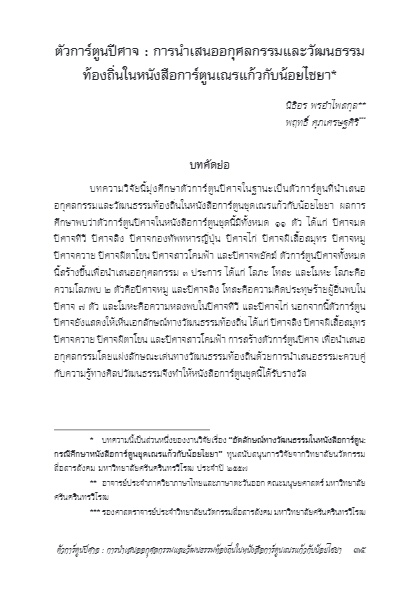นิธิอร พรอำไพสกุล และ พฤทธิ์ ศุภเศรษฐศิริ
บทคัดย่อ
บทความวิจัยนี้มุ่งศึกษาตัวการ์ตูนปีศาจในฐานะเป็นตัวการ์ตูนที่นำเสนออกุศลกรรมและวัฒนธรรมท้องถิ่นในหนังสือการ์ตูนชุดเณรแก้วกับน้อยไชยา ผลการศึกษาพบว่าตัวการ์ตูนปีศาจในหนังสือการ์ตูนชุดนี้มีทั้งหมด 11 ตัว ได้แก่ ปีศาจมด ปีศาจทีวี ปีศาจลิง ปีศาจกองทัพทหารญี่ปุ่น ปีศาจไก่ ปีศาจผีเสื้อสมุทร ปีศาจหมู ปีศาจควาย ปีศาจผีตาโขน ปีศาจสาวโคมฟ้า และปีศาจพยัคฆ์ ตัวการ์ตูนปีศาจทั้งหมดนี้สร้างขึ้นเพื่อนำเสนออกุศลกรรม 3 ประการ ได้แก่ โลภะ โทสะ และโมหะ โลภะคือความโลภพบ 2 ตัวคือปีศาจหมู และปีศาจลิง โทสะคือความคิดประทุษร้ายผู้อื่นพบในปีศาจ 7 ตัว และโมหะคือความหลงพบในปีศาจทีวี และปีศาจไก่ นอกจากนี้ตัวการ์ตูนปีศาจยังแสดงให้เห็นเอกลักษณ์ทางวัฒนธรรมท้องถิ่น ได้แก่ ปีศาจลิง ปีศาจผีเสื้อสมุทร ปีศาจควาย ปีศาจผีตาโขน และปีศาจสาวโคมฟ้า การสร้างตัวการ์ตูนปีศาจ เพื่อนำเสนออกุศลกรรมโดยแฝงลักษณะเด่นทางวัฒนธรรมท้องถิ่นด้วยการนำเสนอธรรมะควบคู่กับความรู้ทางศิลปวัฒนธรรมจึงทำให้หนังสือการ์ตูนชุดนี้ได้รับรางวัล
(ตีพิมพ์ใน วารสารไทยศึกษา ปีที่ 11 ฉบับที่ 1 (มกราคม – มิถุนายน 2558) หน้า 35-64)
Monster: The Representation of Akusala-Kamma and Cultural in ‘Naen Kaew and Noi Chaiya’ Cartoon Book Series
Nition Pornumpaisakul and Prit Supasetsiri
Abstract
This research explores monster characters which are the representations of akusala-kamma and local and cultural identities in ‘Naen Kaew and Noi Chaiya’ cartoon book series. The results show that there are in total 11 types of monster, namely 1. ant, 2. TV monster, 3. monkey, 4. Japanese soldiers, 5. chicken, 6. sea monster, 7. pig, 8. buffalo, 9. ‘Phi-ta-khon’ ghost, 10. ‘sao khom fa’ ghost, and 11. tiger. Each of these monsters represents akusala-kamma — greed, hatred, and delusion. Greed is portrayed through pig and monkey monsters, hatred through 7 kinds of monster, and delusion (or lust) through TV and chicken monsters. Moreover, some monsters (monkey, sea, and buffalo monsters, and ‘ta-khon’ and ‘sao khom fa’ ghosts) are designed to depict local and cultural identities. All in all, with such distinct representation of akusala-kamma, Thai identities, and Dhamma, the series has been highly acclaimed and received many awards.
(Published in Journal of Thai Studies Volume 11 Number 1 (January – June 2015) Page 35-64)
บทความ / Full Text : Download
